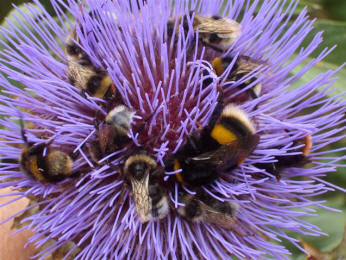Bees prefer nectar laced with neonicotinoids insecticides, which has major  implications for the use of this class of pesticide, a new study has shown.
implications for the use of this class of pesticide, a new study has shown.
Neonicotinoids - neonics for short - are nicotine-mimicking chemicals designed to disrupt the functions of the insect nervous system, leading to paralysis and death.
They are extremely effective for agricultural pest control, but, critically, they don't discriminate between nuisance pests and beneficial pollinators, because nectar produced by neonic-treated plants also becomes contaminated by the chemicals.
However, those favouring the use of the compounds have argued that bees are likely to eschew the nectar from neonic-treated plants on the grounds that it would most likely taste unpleasant.
Now, writing in Nature, Newcastle University scientist Geraldine Wright has found that not only can bees not taste neonicotinoids, but they also prefer to drink nectar laced with the stuff.
At face value these statements seem contradictory, but it appears that the neonicotinoid chemicals, whilst not producing any measurable taste-experience when drunk by a bee, exert an effect on the insect's memory system. This makes them more likely to remember - and hence develop a preference for - feeding from plants producing neonicotinoid-laced nectar.
This preference becomes a self-fulfilling prophesy as the animals repeatedly feed from the same contaminated sources, increasing the levels of the toxin in their bodies to the point where it fatally affects their nervous system.
"The European Union has imposed a temporary moratorium on the use of these compounds while scientists establish what they do," says Wright. "There's very good evidence now for their detrimental effects on these insects. They also are likely to be playing a part in the phenomenon of colony collapse disorder."
- Previous Sexing the Stegosaurus
- Next Drugs Kick-Start MS Repair










Comments
Add a comment